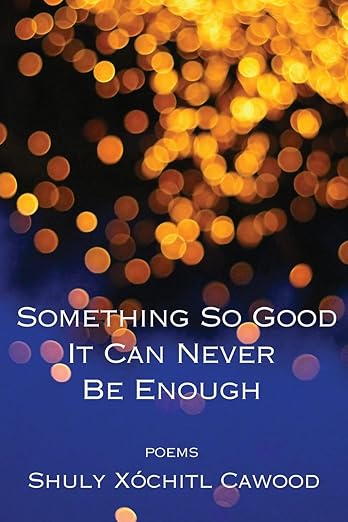Something So Good It Can Never Be Enough
Something So Good It Can Never Be Enough, Shuly Xóchitil Cawood.
2023, 72 pages, paper, $17.95,
ISBN: 978–1–950913–66–9
Ostensibly, the “something so good” referenced in the title is buttermilk rolls. In the poem “My Mother’s One Request,” the speaker (presumably the author) started making them from a recipe at age 15. Her mother loved those rolls, couldn’t get enough, asked her daughter to make them many times, though the process was slow. The daughter, now busy, “tired of the recipe and its need // for each long rise” eventually stops making her mother’s favorite bread. Whether the author feels a twinge of guilt about stopping the flow of rolls is not clear, but the poem comes across as a warning that whenever you create an insatiable demand for something, cutting off the supply can have unfortunate consequences.
The poem is one of several in this collection about cooking and mother–daughter relationships. Another is the prose poem, “My Mother Says She Does Not Know How to Cook,” which begins:
“How did you make this?” she always asks. “A recipe,” I tell
her. No magic trick. No
skill. Just buying ingredients, following directions, not varying
from what I’m supposed
to do. My mother looks in her fridge and pulls out vegetables,
slices them, Even keeps
the stems, sautés them, adds an egg, adds some rice, and what
about that can of water
chestnuts, that might be good, and is there a tomato in the
garden? Oh there’s cilantro out
there, let’s try that.
The notion never occurred to me, until now, that one’s cooking habits might warrant more attention from behavioral scientists. Is the practice of following or not following a recipe predictive of one’s need for structure, variety, lists, schedules, or even love? We don’t know yet. But this poem does something else. It segues into a daughter’s praise for her mother, irrespective of their personality differences. The mother was an immigrant from Mexico, overcame many obstacles and “measured people by their honesty and kindness, not their good or money, not their empty promises. . . .”
A multi–genre writer with published short stories and essay collections, Cawood does not stick to a particular poetic form or style. Some of the poems are prose poems. Most are lineated. Some have short lines, others long expansive lines. Her style is closer to Whitman than Dickinson. She works in conversational language and illuminates nuances of tension and conflict between people. Open about her life, problems, and struggles, she encourages us to ruminate on her own.
Cawood ranges over many subjects, including love, marriage, divorce, beauty, and friendship. My favorite piece in this book is “A Working Definition of Yes,” a poem that makes me want to make a list of all the things I want to say yes to. Here are a few representative lines:
It’s your ruffled red dress. . . .
It’s an investment in hope, expecting more over less . . .
It’s the arrest of a villain. . . .
It’s the hatching of eggs and the mess of dirty dishes
you leave in a heap. . . .
The poem wraps up beautifully with
Yes, is everywhere —
Like fireflies and silver leaves and dogs that chase the rain.
Like dandelion seeds blowing in summer backyard. Like all
those stars behind every cloud you ever saw. Yes is without
regret,
without regard.
— Richard Allen Taylor


